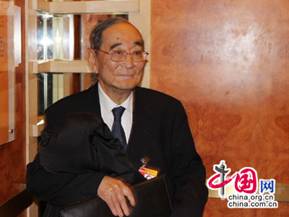Political advisors warns of housing bubbles
As China's housing prices have been soaring over the previous year, economists attending the ongoing parliamentary sessions fear bubbles in the property market.
Li Yining, deputy director of the Economic Commission under the 11th National Committee of the Chinese People's Political Consultative Conference (CPPCC) said the government should change its policies to adjust the market.
 |
|
Professor Li Yining, president of Guanghua Management College at Peking University and the deputy director of the Economic Commission under the 11th National Committee of the CPPCC. |
Figures from the National Bureau of Statistics (NBS) on Jan. 14 showed housing prices in China's 70 large and medium-sized cities rose 7.8 percent in Dec. 2009 from a year earlier, and were up 1.5 percent compared to the previous month.
The property price increase stood at 5.7 percent in November year-on-year, accelerating from the 3.9 percent increase in October.
A Xinhua report quoted economist Hao Daming from China Galaxy Securities as saying that the growth was within expectations due to the low base of the property prices in December of 2008 amid the global economic downturn.
The country's property market was depressed by the global economic downturn at the end of 2008, with property prices in the 70 major cities down 0.4 percent year on year in December and down 0.5 percent from the previous month.
The hike was also a result of purchase rush in the fourth quarter on expectations of tightening policies.
Journalist Kang Juan from Global Times told China.org.cn that people often complain about soaring housing prices. She said: "Many people think that an apartment of one's own is a must-have for marriage. Although the government tries to encourage young people to rent rooms, most couples still dream about their own sweet home."
Relevant figures from the Beijing Municipal Statistics Bureau show that the city's average annual income in 2008 was 44,715 yuan, while urban apartments were selling for an average 15,581 yuan per square meter. (1 yuan is equal to US$0.15)
"NPC deputies and CPPCC members are expected to urge the government to adopt some measures to curb the rising prices," Kang said.
The climbing property prices, driven up by record high bank lending, have become a headache for both Chinese leaders and common residents.
Last December, Chinese Premier Wen Jiabao pledged to cool property prices with tools of taxes, interest rates and land policies.
Since then, a series of moves to cool the market have been made by the government, including re-imposing a sales tax on homes sold within five years of their purchase from this year and increasing the down payment requirement for land purchases to at least 50 percent of the total price.
In January, the State Council issued strict guidelines that required the down payment at no less than 40 percent for those applying to buy a second or more houses backed with loans.
On Jan. 13, the government stressed the importance of stabilizing home prices by providing more affordable housing and cracking down on speculation.
Li Yining also suggested that the government step up its low-cost housing construction.
He said: "Affordable and low-cost housing can play important roles, but the biggest problem is how to monitor it. If there is no strict supervision, the property market can breed bad speculation."
"It is necessary to strengthen supervision. The government should ensure that these houses are allocated to the people who really need them," he added.
CPPCC member Chang Dechuan, also the chairman and president of Qingdao Port Group, said the government's housing policies should cover the "sandwich class," who cannot buy the affordable apartment and are disqualified for low-cost housing application.
Jia Kang, director of the Research Institute for Fiscal Science under Ministry of Finance, called for more care for young people.
He said: "The government should consider the young people, who have just graduated from college or started to work for a while."
"Different from the developed countries like the U.S. and the U.K., the house renting condition isn't ideal. For example, it's common that four or five young people share a single room or they rent an empty apartment without necessary life facilities," he told China.org.cn. "Under this renting condition, people have a very strong desire to have a stable place to stay."
Jia stressed the importance of building more low-cost apartments, establishing house renting standard and special financial aids or loans to young people.
 0
0 






